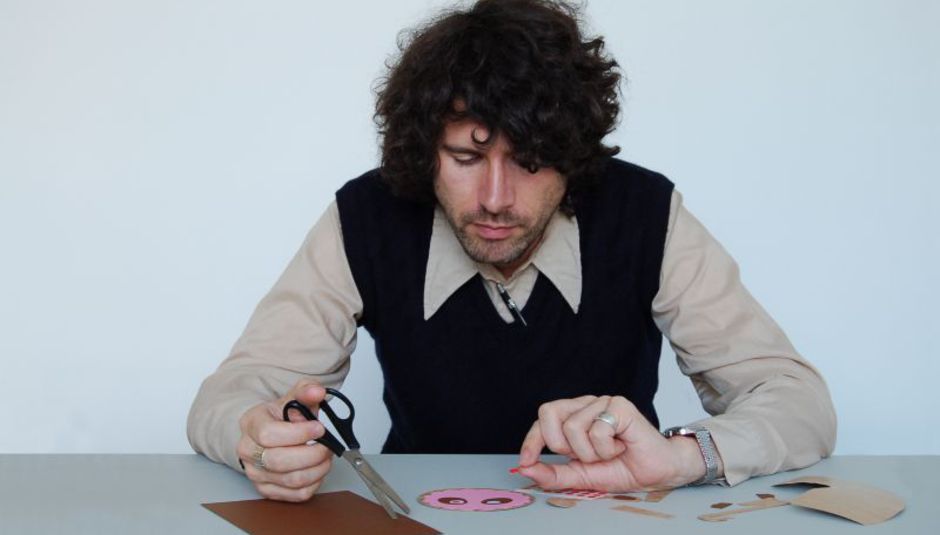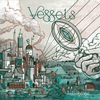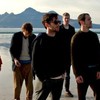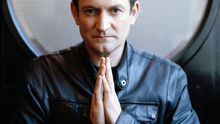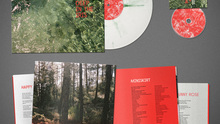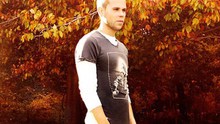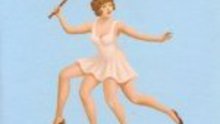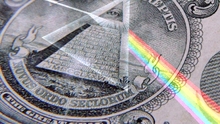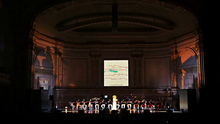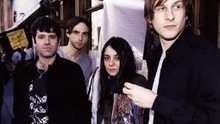When meeting Gruff Rhys it’s hard not to break out in a face-achingly large smile – this is, of course, a man responsible for some of the warmest melodies this side of the 21st century under a multitude of guises: Super Furry Animals, Neon Neon and his own solo career.
After last year’s psychotic explorations with Brazillian protest-pop artist, Tony Da Gatorra, Gruff has returned with his third solo album Hotel Shampoo. A record soaked in sun-soaked Californian harmonies and self-declared piano ballads that saw DiS’ Aaron Lavery awarding it a godly 7/10.
Shielded away from a cold winter’s afternoon in the surprisingly cosy basement of Shoreditch’s Strongrooms, Gruff Rhys politely doesn’t balk when shaking our near frost-bitten hand. Despite being the last interview of a very long day, Gruff is incredibly polite, sipping occasionally from a mug of tea and taking time to carefully word each answer in his still evident Welsh lilt.
DiS: You released Hotel Shampoo on Valentines Day and the record as a whole seems to have the theme of love running throughout it. Was that deliberate timing?
Gruff Rhys: It was a co-incidence, the timing is horrific. You know, it’s horrible. That’s nothing to do with the contents of the record, but the record is kind of a reflective album looking back, just fragments of memories. Yeah, there’s a couple of power ballads (laughing).
DiS: Yeah, like ‘Vitamin K’ and ‘At The Heart Of Love’. It’s in stark contrast to where you were last year when you did the side-project with Tony Da Gatorra, The Terror Of Cosmic Lonelines, which was like an assault of electro, techno and a bit of glam.
GR: I wanted to make a heartbreak record, but I thought it would be interesting to make a multiple heartbreak record instead of one record related to one big break-up or something that would be a completely over the top. Not necessarily based on reality, but kind of twelve break-ups or something like that. It’s definitely quite melancholy.
DiS: Tracks like ‘Sophia Softly’ seem reminiscent of Scott Walker and Brian Wilson where the heartbreak is reflected in the orchestration and the harmonies. Was that something you were aiming for?
GR: Yeah, when I was recording it I was 39 and I knew it’d be released when I was 40, so I thought it would be. I thought I should really make a piano album.
DiS: It was about time?
GR: Yeah, you know what should someone like my age be doing? So, you know I’ve got to make a piano album with a bit of saxophone. I wanted to confront aging as well.
DiS: Do you feel like you confronted it on the record?
GR: I think so, because I don’t feel particularly different. I wasn’t trying to engage with pop music or anything particularly contemporary, just make a sort of particularly downbeat album.
DiS: It doesn’t feel too downbeat, it feels the most contemporary out of your solo albums. Did you want it to be quite pop?
GR: I wanted it to be like an MOR kind of west coast album, like when hippies started to take cocaine and make weird music about their pain of being millionaires. But, it’s an experience of.
DiS: Like Arthur Lee and Love?
GR: Like, Fleetwood Mac or Dennis Wilson. But, I think I’ve failed to capture that, because I can’t relate to that experience itself in being that rich in that I don’t take loads of cocaine. I think that was in the back of my mind, but I think I failed in that sense but there’s bit of it.
DiS: I think the harmonies are reflective of that era and also the first few Super Furry Animals albums, like Radiator, in their simplicity.
Yeah, the songs are kind of simple. It took about three weeks to make as I didn’t want to over work the songs.
DiS: It was your longest solo album to make out of the three. Why did you take longer on this record?
GR: I wanted it to be refined, but I didn’t want to make it overblown.
DiS: You worked with Andy Votel on this record. How do you know Andy?
GR: I’ve helped him out a little bit releasing a few compilations called Welsh Rare Beat with old Welsh language records from the seventies, and we did that about five years ago. And I’ve DJed quite a lot with him, he’s an amazing DJ and he started putting out records by the name Anagram Jam and they’re amazing.
I had this song called ‘Christopher Columbus’ and I wanted to sample these old records, and I love the Anagram Jam records, so I phoned him up and said ‘oh, can I come to Manchester and record the song’ and he was like, ‘yeah, yeah, yeah’. It was amazing, because we recorded ‘Shark Ridden Waters’ as well, which came out of nowhere.
DiS: There seems to be a maritime theme on those songs. Did that come from those sessions?
GR: Andy started to amass samples relating to the sea, so like old shark disaster movies and creaking ships and things. We had a lengthy discussion about sharks, we went out for a Turkish meal and had some Efes beer and we kind of came up with the concept of Shark Ridden Waters; it’s sung from the position of the shark about to eat someone and so it’s pretty random. I didn’t expect when I started the record to make that song, which makes me even more excited about it.
DiS: Yeah, the lyrics and subject matter of the ‘Shark Ridden Waters’ and ‘Christopher Columbus’ seem very different to the rest of the album.
GR: They were sort of recorded after the rest of the record, so it could have been a really different record if we’d started with them.
DiS: ‘Conservation Conservation’ is about eco-politics. Is that something that’s important to you?
GR: It is. You know, I hate the way David Cameron and his government paint themselves with green credentials when they’re just in the pocket of multi-national corporations. The whole vocabulary of ecology has been taken over by PR firms and governments, and it’s become sort of meaningless and frustrating.
DiS: Tony Da Gatorra is known for being politically active and seems like a unique character. What was it like to work with him?
GR: It was incredible! [He’s] one of the most resourceful people I’ve ever met; he arrived in Heathrow with just a tiny bag, like a satchel, and his gatorra. He’s like a magician, every day he’d produce something like a giant flag from his bag things that could no way fit in the bag - he had so many surprises up his sleeve.
I think he’s found an original way of conveying protest songs without using rhetoric, I mean, he’s completely sincere. You know, he’s built a drum machine shaped like a communist sickle to back himself up? Obviously, he rants about Brazilian corruption.
DiS: It takes a certain strength and character and self-belief to be that outspoken.
GR: Yeah, I’m hoping that he’ll influence me in some way somewhere down the line. Unfortunately, direct kind of song-writing and protest songs don’t come to be naturally. Hopefully, at some point he’ll have a good influence on me.
DiS: He doesn’t speak much English, does he?
GR: Yeah, and I don’t speak Portugese - we were communicating through noise and energy. It’s amazing, I loved playing the concerts with him they were probably the most extreme live experiences I’ve ever had and the most unpredictable. It kind of split the audience, on one-hand we were having stage invasions and people going nuts and completely into it, and a third of the audience would leave and another 20% standing just not really sure what was happening.
DiS: Did you feel that after doing the project with Tony that you wanted to get back basics and return to just making music with just an acoustic guitar?
GR: We recorded that album [Terror Of Cosmic Loneliness] in 2007 and just didn’t get round to releasing it until last year….Like, I was working on the Neon Neon album at exactly the same time as the Candylion album and they were both completely different, but recorded simultaneously.
DiS: Do you feel like you need to have a multitude of creative outlets?
GR: I don’t know I’ve never planned it. I didn’t really decide. I don’t know, I suppose the songs dictate what kind of life they take on. I don’t plan really. I mean, Boom Pip was driving the Neon Neon album initially. He invited me to make a crazy record, so I was like ‘Yeah, ok!’
DiS: When it’s a record about De Lorean, you can’t really say ‘no’?
GR: Well, we hadn’t hit on a concept but we just booked studio time and on the first day we decided that there had to be a good reason to record, otherwise there was really no point doing it. And, we hit on an amazing idea and we kind of built and recorded it in a really intense two week period. I’ve never worked like that before on a theme – it was amazing.
DiS: Do you have any plans to do something with Neon Neon again as it was so well received as project?
GR: It would be amazing to do something, but there would have to be a really strong idea and time. I’m putting this record out and Boom Pip’s new album’s almost finished.
DiS: Is there anyone else you want to work with at the moment?
GR: No, I’ve never had any ambitions to collaborate with anyone. When we first started out as Super Furry Animals … we were completely anti-collaborations, we wanted to be militant. I think I ended up singing on a Mogwai track as it involved a two day bender in Glasgow, and that was the beginning of my corruption [laughs].
DiS: What are the rest of the Super Furries up to? Do you have any plans to make another record?
GR: Yeah, we’ll make the tenth album. Dafydd and Cian have wrote a soundtrack for a TV series, I think they’ve done two series. Guto’s been touring with Spectrum, Sonic Boom’s band – Spaceman 3 were one of his favourite bands when he was growing up so he’s fulfilling a dream. Bunf’s been recording incredible songs, by far amazing and unique songs, I don’t know what he’s going to do with them.
Mostly, we’ve just been sorting our lives out ….and last summer was the first time we haven’t done festivals for fifteen years, so it’s amazing not doing it for a little bit to recharge our batteries.
DiS: When do you think you’ll head back into the studio?
GR: I suppose, when we’ve all stopped going mad and when we’re refreshed. Because, we put so much into our albums, emotionally and they’re like incredible adventures that take months to make, it means dedicating everything to it.
DiS: The video for ‘Shark Ridden Waters’ depicts someone who’s immersed in social media. Do you think there are a lot of evils in social media?
GR: Not necessarily evils, I just find it interesting how you can live two lives simultaneously. The video I did looked like a Goddard film; I wanted it to look if social networking existed in the 1950s what would it look like? Yeah, it was bonkers.
DiS: Fun to make?
GR: Yeah, it was nuts! Really intense. We didn’t have any permits to film and the cops kept chasing us. We had a replica gun and hundreds of thousands of units of fake money, and it just looked really dodgy!
DiS: You’re heading out on tour this month. When you did some dates when you announced the album they were very low key? Will you have a full band this time?
GR: I’m really excited, because Yi Nwl are going to back me up; they’re like an instrumental surf band from North Wales, it means the fog, they’re like a post-rock band playing surf. It sets a good mood for the winter months it’ll be like transporting everyone into summer initially.
They’re going to help me play my solo back-catalogue, which I’ve never fully realised live before, but everything has a slight surf feel just because of the way they play because they’re used to playing surf music. We’ve made a pledge that we’ll sign any surf boards, if anyone brings any surf boards or if anyone’s got any fake palm trees to bring along to the gigs.
DiS: Miles Kane features on the record too on Space Dust#2. How did he get involved?
GR: A couple of years ago he asked me to produce his record and I didn’t end up producing his record, but I ended up producing a couple of songs for his album. I had no idea how seriously great guitarist he is, he’s like a surf guitar god. He needs to be making 20 minute guitar solos and I’m sure he will. Yeah, so I asked him to play some surf guitar on that song.
DiS: Just out of interest, what’s the sample at the end of ‘Shark Ridden Waters’?
GR: It’s a song by The Cyrkle from 1968 called, ‘It Doesn’t Matter Anymore’, by Burt Bacharach and Hal David. The whole song’s really built on top of that, so they get half the royalties.
DiS: Did you use many other samples as it sounds very stripped back?
GR: Yeah. Chris Walmsley, who plays with the Seven Thunders, plays most of the drums on it. Most of the basic tracks, we recorded over a day just a really intense day. It was really quite simply recorded.
DiS: It does feel like you should be in a nice suit on a seventies TV show lounging over a piano.
GR: I suppose it needed to be a hotel bar album, a shit piano band playing in a shit hotel bar.
DiS: But, less of the ‘shit’?
GR: Yeah.
DiS: You did an art installation last year with shampoo bottles that you’d collected over years of touring. What’s happened to the shampoo bottles now?
GR: I built the hotel and it’s still a dwelling and it’s just in Cardiff. If anyone wants to borrow it, it’s available for bookings.
DiS: It’s very small!
GR: I can fit in it, though. It’s the size of a large dog kennel. It’s like a document of the boom years, but it’s like looking back at the musical boom years of the nineties and early 21st century. I think the album’s doing that as well – in my mind both are related. I think the name Hotel Shampoo fits the hotel better than the record, but I find the two inseparable so I ended up stealing the name from the record.
DiS: It’s like a guilty secret that you’ve aired of obsessively hoarding all these shampoo bottles?
GR: Yeah, I’ve been planning this for over a decade so it’s a huge relief to get it out the way so I don’t have to collect all this. I was quite shocked at how much disposable stuff people give away and excited about it too.
DiS: Do you have a new passion?
GR: I always collect records but I’m not a completist, it’s quite random. I don’t obsess over it either. I don’t look after the records I just play them, put them on the floor and then back in the wrong cover.
DiS: You also released Separado! last year - a documentary about you searching for your long lost South-American uncle. Are you going to do any follow-ups to that?
GR: In my head it’s part of a trilogy of investigative concert tours, so I’ve got two others planned. But, Separado! took five years to make. It was filmed over a period of about a year and a half and took three and a half years to edit, so the other two might not get made but I’d like to.
DiS: Did you enjoy making it?
GR: It was a lot of fun, but the biggest undertaking I’ve ever taken on. Dylan Goch shot it and edited and he was literally in front of the screen for years. And, then I had to do a soundtrack which was like making an album – I had no idea how much work. We were like, ‘fuck it, let’s make a film! We’ve got a camera.’ It was three hours long at one point and it took about a year to get it down to an hour and a half. It was nuts, but very rewarding.
DiS: What have you got planned for the rest of the year?
GR: Touring Hotel Shampoo. Separado! is on tour as well at film festivals and has been for a big chunk of last year, so I’m still touring with that which is weird for me. I get to play concerts around the film, so I’ll be touring.

